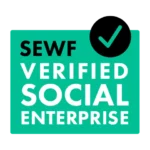On 17 March 2022, Unchained had the privilege of hosting Rachel Rose Nelson for our monthly webinar. She is the Executive Director for Freedom Business Alliance and works to release people from human trafficking through job creation. She has advice for anybody looking to start a business or already running one. Freedom businesses can be anything from hospitality, serving a town or a western market, or a business that is more service-orientated, competing with an offshore sector.
Rachel has personal experience with survivors of human trafficking. For her own business, she considers herself still emerging and continues to grow as she works out her goals and visions. She continues to look for partners to come alongside her and craft plans about how to create freedom businesses in different regions.
The key takeaways from this webinar:
Your business: Rachel shares that it doesn’t matter what business you own or how long it’s been running for, if you have a business, then it can be a Freedom Business. Human trafficking can be integrated into any business or supply chain including, food, cotton, coffee, construction, garment creation, etc. It’s important that every business owner is transparent with their supply chain and knows how all of their products are being sourced. If you’re not someone who owns a business, then you are still able to choose the companies that you are supporting and make sure that you’re supporting Freedom Businesses.
An opportunity for a solution: Rachel’s business is designed to help any business become a Freedom Business and therefore, there is an opportunity for everyone to be a part of the solution of eradicating human trafficking from businesses. When someone is released from human trafficking, there is a high chance that they will be re-trafficked if they do not have another job. Therefore, people who have the heart to change this are able to either begin a business, like Freedom Business, to deal with this issue. Or if you already have a business, rescuing people from human Trafficking and hiring them, paying them a fair wage, will also help the problem.
Resilience and cultural sensitivity: you cannot be a Freedom Business without addressing the issue of Human Trafficking with resilience and cultural sensitivity. For any business owner, even just the starting up of the business takes resilience and determination, it’s never easy. In the same way, trying to deal with a social issue that has been existing for years, isn’t going to disappear easily either. However, when businesses unite under the same goal of removing human trafficking from business and opening up job opportunities for survivors, it is more likely that the goals will be reached. It’s also important to approach the issue with cultural sensitivity and be aware that communication between different countries, jobs, and businesses may need to vary depending on the situation you could be dealing with.





